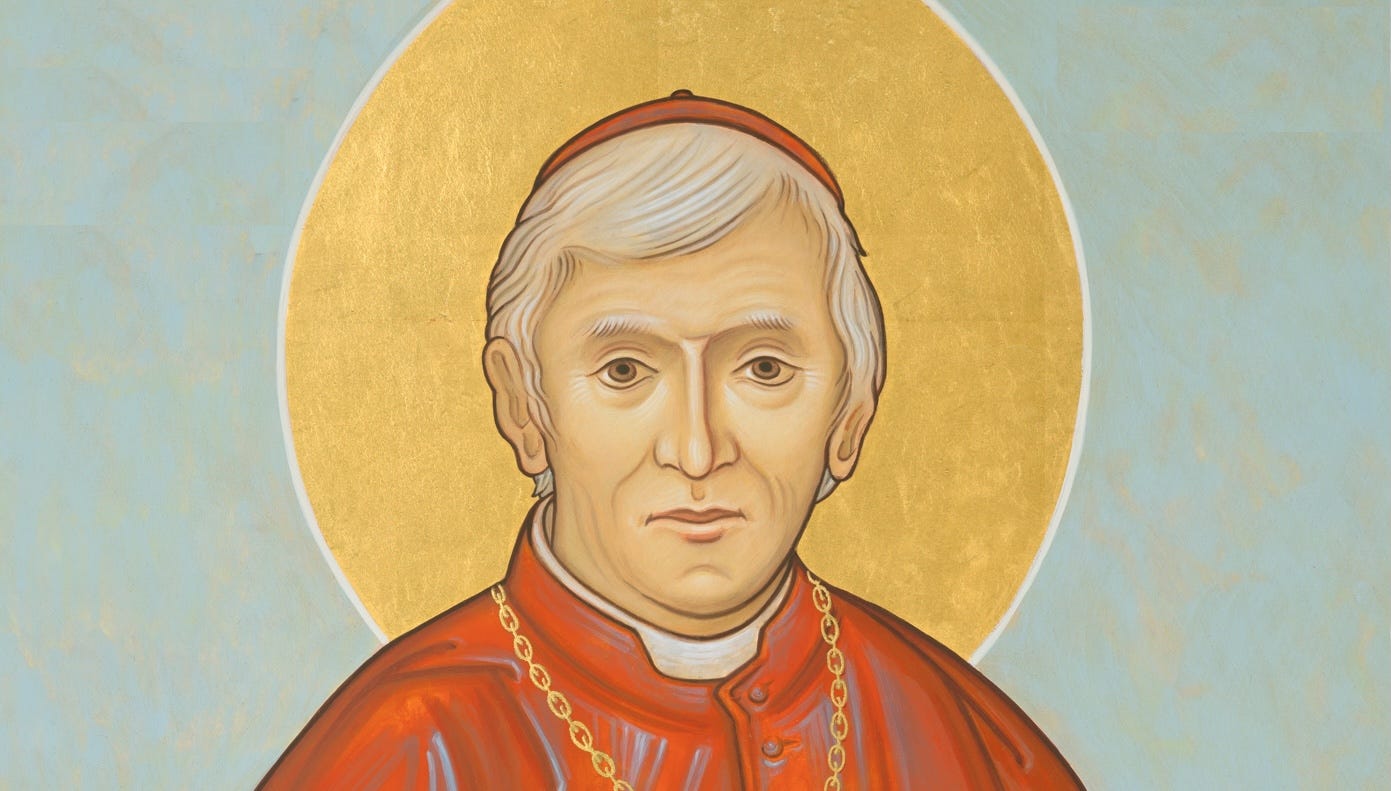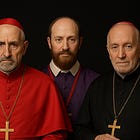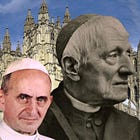Newman, Doctor of the Church? McCusker's interview with Kokx News
What should we make of Cardinal John Henry Newman’s alleged elevation to the status of Doctor of the Church – as well as his canonisation, and other aspects of his legacy?

What should we make of Cardinal John Henry Newman’s alleged elevation to the status of Doctor of the Church – as well as his canonisation, and other aspects of his legacy?
Editor’s Notes
The WM Review’s Matthew McCusker was recently interviewed by Stephen Kokx of Kokx News on the subject of John Henry Cardinal Newman, and Leo XIV’s announcement that he would be declaring Newman a “Doctor of the Church.”
This announcement provoked a variety of reactions – some of which considered Newman as a liberal or proto-modernist and condemned/celebrated accordingly; others considered Newman as an opponent of liberalism, and condemned/celebrated accordingly.
McCusker’s approach is less common: recognising Newman’s opposition to liberalism, and yet lamenting this latest move precisely from an anti-liberal perspective.
Mr Kokx has given us permission to re-publish this interview here.
S.D. Wright
The Final Word on Cardinal Newman: 'Opponent of Liberalism'
Stephen Kokx: What was your initial reaction to the news that Cardinal John-Henry Newman is going to be declared a Doctor of the Church?
Matthew McCusker: My initial reaction was one of dismay, because the enemies of the Church will certainly use this recent declaration to promote Modernism and Liberalism. They will do this by misrepresenting Newman as a liberal and proto-Modernist, even though his entire life was dedicated to the destruction of Liberalism and though he foresaw the coming of Modernism and sounded the alarm.
Let’s look more closely at the claim that Newman was a liberal. This is the precise opposite of the truth. Newman’s first public actions — in the General Election campaign of 1829 — were motivated by opposition to liberal influence within the Tory party. He became the leading figure of the Oxford Movement, which was fundamentally an anti-liberal movement, theologically and politically. Throughout his Anglican life, he was profoundly, deeply, opposed to liberalism, the “new-compass’d art of the ancient Foe,” as he referred to it a poem. In fact, he held the battle against liberalism to be the chief object of the Oxford Movement.
As he approached his conversion he expressed the view that “The spirit of lawlessness came in with the Reformation, and Liberalism is its offspring.”1 Indeed, one of his great fears about his conversion, was that those who did not follow him forward into the Church would but fall backwards into liberalism. In the Apologia Pro Vita Sua he recalled:
“The most oppressive thought, in the whole process of my change of opinion, was the clear anticipation, verified by the event, that it would issue in the triumph of Liberalism. Against the Anti-dogmatic principle I had thrown my whole mind… I was one of those who had kept it at bay in Oxford for so many years; and thus my very retirement was its triumph. The men who had driven me from Oxford were distinctly the Liberals.”2
He continued:
“As I have already said, there are but two alternatives, the way to Rome, and the way to Atheism: Anglicanism is the halfway house on the one side, and Liberalism is the halfway house on the other. How many men were there, as I knew full well, who would not follow me now in my advance from Anglicanism to Rome, but would at once leave Anglicanism and me for the Liberal camp.”3
Therefore, he was telling the straightforward truth when he said, during the speech he made on receiving the cardinal’s hat in 1878: “one great mischief I have from the first opposed myself. For thirty, forty, fifty years I have resisted to the best of my powers the spirit of liberalism in religion. Never did Holy Church need champions against it more sorely than now, when, alas! it is an error overspreading, as a snare, the whole earth; and on this great occasion… I renew the protest against it which I have made so often.”
I share these examples just to give some idea of how false the generally accepted narrative is.
John Henry Newman ought to be known as one of the great nineteenth century opponents of liberalism. That it is otherwise reflects the strange fate that has befallen Newman, of being misrepresented so completely.
SK: It seems this is being done to baptize the conciliar revolution and to give it a new mascot. Also, it appears to be aimed at canonizing the "development of doctrine" argument one so frequently hears about Vatican II? Do you agree?
MJM: Yes. The Modernists hold that every aspect of Catholic doctrine and religious practice has developed over time and is ultimately just the product of internal experiences. That’s what they mean by “development of doctrine.”
When they see Newman use the term, they latch onto it and say “see, Newman believed in development of doctrine, we are just following Newman.”
They aren’t really interested in whether Newman’s views aligned with their own or not, they just want to be able to use his name. They look for ways to justify their position and to deceive Catholics into thinking it is compatible with the faith.
This misuse of Newman was was actually identified and condemned by Pope St Pius X, in his Apostolic Letter Tuum Illud:
“It is clear that those people whose errors We have condemned in that document [Pascendi Dominici Gregis] had decided among themselves to produce something of their own invention with which to seek the commendation of a distinguished person. And so they everywhere assert with confidence that they have taken these things from the very source and summit of authority, and that therefore We cannot censure their teachings, but rather that We had even previously gone so far as to condemn what such a great author had taught.”4
The Holy Father then went on to note their “obstinacy” and “deceitfulness” in this regard and wrote that what “the Modernists do is to falsely and deceitfully take those words out of the whole context of what he meant to say and twist them to suit their own meaning.”
Newman was not a Modernist or a proto-Modernist, quite the contrary. St Pius X himself judged that “the writings of Cardinal Newman, far from being in disagreement with Our Encyclical Letter Pascendi, are very much in harmony with it.”
(My colleague at the WM Review, S.D. Wright has written a number of articles on the harmony between Newman’s writing and Pascendi.)
The Holy Father continued: “Regarding the large number of books of great importance and influence which he wrote as a Catholic, it is hardly necessary to exonerate them from any connection with this present heresy.”
And, he judged, “nothing can be found to bring any suspicion about his faith.”
So, there we have the judgement of the pope who, more than any other, unmasked and condemned the heresy of Modernism.
SK: What did Newman actually teach about the "development of doctrine"? Was Vatican II actually a "development of doctrine"?
MJM: Newman wrote his Essay on the Development of Doctrine while he still an Anglican, though on the brink of conversion. One of the most challenging questions for many converts from Anglicanism was to understand how the Catholic Church could propose for belief many dogmas that they could not find clearly and explicitly affirmed in Sacred Scripture or the writings of the Church Fathers. The Anglican answer was, of course, that these things were innovations and novelties, and, at worst, corruptions of doctrine.
Newman set himself the task of resolving this question to his satisfaction. In the end however the grace of faith overtook him, and he was received into the Church with the book still unfinished.
The answer Newman that came to is that there was indeed a divine revelation delivered to the Church in its entirety, but that it takes time for everything which is implicit in that revelation to be made explicit. This process he called “the development of doctrine.”
This is, of course, completely incompatible with the Modernist notion of development, which denies the existence of divine revelation, as a body of truths revealed by God to the Church. To the Modernist, doctrine is the result of internal human experiences, and changes over time to match human experiences.
If you are a Modernist, you can easily reconcile yourself to changes in doctrine such as the new doctrine of religious liberty found in Dignitatis Humanae. The Modernist takes it for granted that as human society changes and develops, so too does doctrine change.
Such a change is completely incompatible with Newman’s understanding of development, because the doctrine of Dignitatis Humanae directly contradicts the teaching of the Catholic Church.
Interestingly, in an appendix to the Apologia Pro Vita Sua Newman drew up what we could call “Newman’s Syllabus of Errors” which he regarded as the key tenets of liberalism. Three of them are as follows:
There are rights of conscience such, that everyone may lawfully advance a claim to profess and teach what is false and wrong in matters, religious, social, and moral, provided that to his private conscience it seems absolutely true and right.
There is no such thing as a national or state conscience.
The civil power has no positive duty, in a normal state of things, to maintain religious truth.
Newman rejected all these errors; how then could he possibly have regarded Dignitatis Humanae as a legitimate development of doctrine, had he lived to see it?
SK: Is Newman a worthy "Doctor of the Church?"
MJM: That is an interesting question. Newman was certainly a great man, a great scholar, a great writer, a great priest, a great preacher and possibly — when we have a pope again — the Church may decide that he was also a great saint.
But is he worthy to be called “Doctor of the Church?”
He was certainly extraordinarily erudite. His unusual intelligence was recognised early. He had vast knowledge and incredibly broad interests. The historian James Anthony Froude, who was the younger brother of one of Newman’s closest friends and studied at Oxford while Newman was at the height of his influence, recalled that:
“Newman's mind was world-wide. He was interested in everything which was going on in science, in politics, in literature. Nothing was too large for him, nothing too trivial, if it threw light upon the central question, what man really was, and what was his destiny…”5
And he continued:
“But his own subject was the absorbing interest with him... If Christianity was true, since Christianity was true (for Newman at no time doubted the reality of the revelation), then modern England, modern Europe, with its march of intellect and its useful knowledge and its material progress, was advancing with a light heart into ominous conditions. Keble had looked into no lines of thought but his own. Newman had read omnivorously; he had studied modern thought and modern life in all its forms, and with all its many-coloured passions.”
From those studies, Newman formulated and communicated important lessons for those of us who live in the modern world, and for whom he feared greatly.
For example, in his sermon on the “Infidelity of the Future” he warned seminarians:
“My Brethren, you are coming into a world, if present appearances do not deceive, such as priests never came into before…”6
And he said:
“I think that the trials which lie before us are such as would appal and make dizzy even such courageous hearts as St. Athanasius, St. Gregory I, or St. Gregory VII. And they would confess that dark as the prospect of their own day was to them severally, ours has a darkness different in kind from any that has been before it.
“The special peril of the time before us is the spread of that plague of infidelity, that the Apostles and our Lord Himself have predicted as the worst calamity of the last times of the Church. And at least a shadow, a typical image of the last times is coming over the world. I do not mean to presume to say that this is the last time, but that it has had the evil prerogative of being like that more terrible season, when it is said that the elect themselves will be in danger of falling away.”
For those of us who live in the world which he foresaw, Newman has much to teach about its errors, their roots, and how to combat and heal them. In addition, his sermons and meditations provide straightforward spiritual nourishment; his controversial writings excite and instruct, and his essays, novels, and poems cast light on varied aspects of human life and knowledge. A case could certainly be made in favour of him being made a doctor of the Church — when we have a true pope with the authority to declare it.
On the other hand, there is also a strong objection that I think could be made, namely that he did not produce a large body of properly theological work.
He did not regard himself as a theologian. He turned down more than one offer to be a peritus at the Vatican Council on the grounds that he was not a theologian. Explaining his decision to a nun, who was an old family friend, he wrote:
“[R]eally and truly I am not a theologian. A theologian is one who has mastered theology—who can say how many opinions there are on every point, what authors have taken which, and which is the best—who can discriminate exactly between proposition and proposition, argument and argument, who can pronounce which are safe, which allowable, which dangerous—who can trace the history of doctrines in successive centuries, and apply the principles of former times to the conditions of the present. This it is to be a theologian—this and a hundred things besides—which I am not, and never shall be.”7
For this reason, Newman would probably say he should not be named a Doctor of the Church. But a future pope will decide.
SK: Anything else you'd like to add?
MJM: I think it would be fitting to end with the advice given to Modernists by Pope St Pius X in Tuum Illud:
“Would that they should follow Newman the author faithfully by studying his books without, to be sure, being addicted to their own prejudices, and let them not with wicked cunning conjure anything up from them or declare that their own opinions are confirmed in them; but instead let them understand his pure and whole principles, his lessons and inspiration which they contain. They will learn many excellent things from such a great teacher: in the first place, to regard the Magisterium of the Church as sacred, to defend the doctrine handed down inviolately by the Fathers and, what is of highest importance to the safeguarding of Catholic truth, to follow and obey the Successor of St. Peter with the greatest faith.”
HELP KEEP THE WM REVIEW ONLINE WITH WM+!
As we expand The WM Review we would like to keep providing free articles for everyone.
Our work takes a lot of time and effort to produce. If you have benefitted from it please do consider supporting us financially.
A subscription gets you access to our exclusive WM+ material, and helps ensure that we can keep writing and sharing free material for all.
You can see what readers are saying over at our Testimonials page.
(We make our WM+ material freely available to clergy, priests and seminarians upon request. Please subscribe and reply to the email if this applies to you.)
Subscribe to WM+ now to make sure you always receive our material. Thank you!
Read Next:
Follow on Twitter, YouTube and Telegram:
Recalled in the Apologia Pro Vita Sua, Part VI, https://www.newmanreader.org/works/apologia65/chapter4-1.html.
John Henry Newman, Apologia Pro Vita Sua, Part VI, https://www.newmanreader.org/works/apologia65/chapter4-1.html.
John Henry Newman, Apologia Pro Vita Sua, Part VI, https://www.newmanreader.org/works/apologia65/chapter4-1.html.
Pope St Pius X, Tuum Illud, https://www.newmanreader.org/canonization/popes/acta10mar08.html.
James Anthony Froude, Short Studies on Great Subjects, Vol. 4, https://newmanreader.org/biography/jafroude.html
John Henry Newman to Sr Maria Pia, February 10 1869, quoted in Wilfrid Ward, John Henry Newman: Vol II, Ch.,29.
https://www.newmanreader.org/biography/ward/volume2/chapter29.html







"To the Modernist, doctrine is the result of internal human experiences, and changes over time to match human experiences."
John Paul II as a philosopher was enamored with the Phenomenology of the Jewish philosopher Edmund Husserl & of the converted (?) Jew Max Scheler, based largely on human experience and at least questionably compatible with the philosophical realism of St Thomas. I'm sure that influenced JPII's Modernist beliefs. Someone may object that he exalted St Thomas in his encyclical Fides et Ratio, but he didn't even write it, except for maybe a few lines like the deceptively attractive discription, "Faith and reason are like two wings on which the human spirit rises to the contemplation of truth." Two wings on a bird or plane, however, are equal in what there are and what they do, faith and reason are not. The encyclical was written by a former professor of mine, Fr Georges Cottier, OP.
Thanks for this.